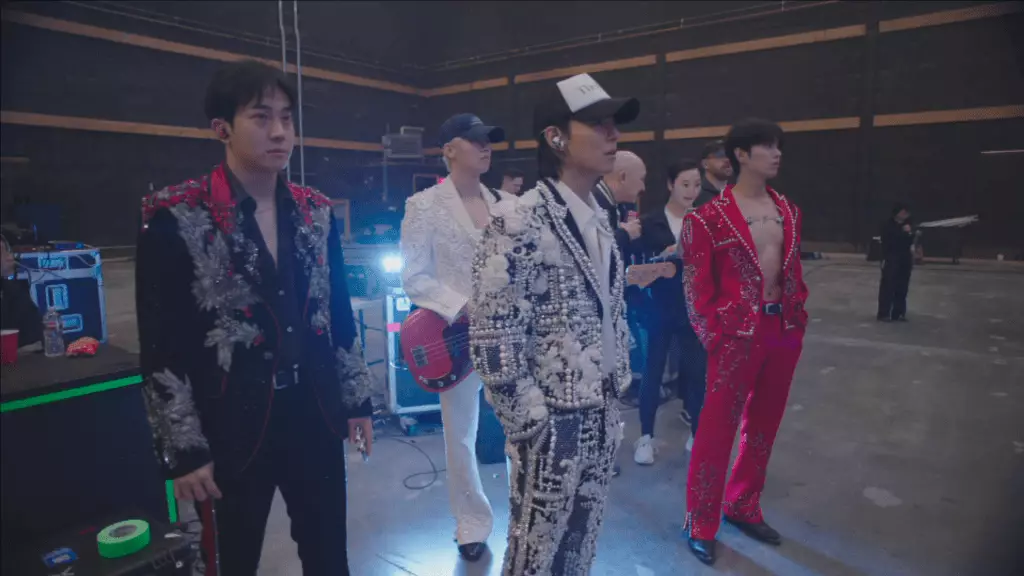In recent years, Korean culture has experienced what some might call an extraordinary global conquest—from K-Pop sensations to critically acclaimed films like *Parasite*. However, this meteoric rise is a double-edged sword. While the international appetite for Korean art suggests a desire for diversity and fresh creativity, it often risks reducing complex cultural narratives into commercialized commodities. The recent acquisition of the documentary *The Rose: Come Back to Me* by CJ 4DPLEX underscores this phenomenon. It’s not merely about celebrating a band’s journey; it’s about leveraging Korea’s cultural export machinery to fulfill corporate and global entertainment markets, often at the expense of authentic storytelling.
The film’s narrative, centered around The Rose—a band blending Korean and English songs—serves as a reflection of cultural hybridity. But beyond the surface, it hints at a deeper societal yearning for genuine human experiences amid the digital age’s superficial veneer. The band’s emphasis on “heartfelt interviews” and “behind-the-scenes stories” allude to a desire for real connection in a world increasingly dominated by curated images. Yet, the corporate machinery behind the film, with its global theatrical ambitions, risks commodifying this vulnerability, transforming it into a marketable product rather than fostering true cultural dialogue.
The Power of Music as a Catalyst for Societal Change
Music has often been a mirror—sometimes a catalyst—of societal transformation. For The Rose, their story of perseverance, heartbreak, and personal growth resonates beyond their fan base. It speaks to a universal hunger for authenticity, a subtle yet powerful rejection of the sanitized, commercialized versions of success that dominate mainstream media. The documentary’s focus on their creative involvement, songwriting, and stage direction illustrates a desire to showcase artistry rooted in conviction—not just spectacle.
In this context, the film becomes more than a musical biography; it reflects a societal impulse toward meaningful storytelling amid an entertainment landscape saturated with superficial content. The band’s bilingual performances symbolize a bridge—an attempt to connect disparate cultures through shared emotional experiences. Yet, the question remains: Will these stories genuinely challenge the spectator’s worldview, or will they be siphoned into a lucrative franchise, further validating the commodification of culture?
The Role of Corporate Power in Shaping Cultural Narratives
CJ 4DPLEX’s role in this narrative cannot be overlooked. As a division of the CJ Group, and intrinsically linked to a larger ecosystem that includes CJ ENM—the creators of *Parasite*—their involvement signals a strategic push to embed Korean cultural products within global markets. While this undoubtedly opens doors for artists like The Rose, it also raises concerns about who controls the narrative. Is this authentic expression, or merely a calculated move to capitalize on the current cultural zeitgeist?
The fascination with immersive technology—4DX, SCREENX, Ultra 4DX—further exemplifies how corporate interests are reshaping the cinematic experience. These innovations promise to transform passive viewers into active participants, but in doing so, risk replacing genuine storytelling with sensory overload. Such technologies can excite audiences, but they may also dilute the story’s emotional core, turning sincerity into spectacle.
Why Authenticity Matters More Than Ever
Ultimately, the success of *The Rose* and similar projects hinges on whether audiences seek authenticity or merely entertainment. The band’s story showcases resilience, individuality, and the transformative power of music—values that are increasingly scarce in a commercialized culture that favors quick hits over meaningful engagement. If the documentary can tap into this hunger for real human connection, it might serve as a reminder that popular culture still has the potential to challenge societal norms.
However, the risk remains that these narratives are co-opted by a system more interested in profits than genuine cultural enlightenment. It’s imperative that audiences remain critical and discerning, recognizing when art is used as a vehicle for societal reflection and when it is simply a product designed to maximize shareholder value. Conversely, fostering spaces where authentic stories and cultural expressions can thrive outside the relentless grip of commercial interests is essential to preserving the integrity of cultural movements.
This tension between commercialization and authenticity is at the crux of contemporary cultural production. While Korean entertainment continues its dominance, it is crucial to remember that true cultural progress relies on stories that challenge, question, and inspire—rather than just entertain or serve as a shiny façade for corporate ambitions.


Leave a Reply